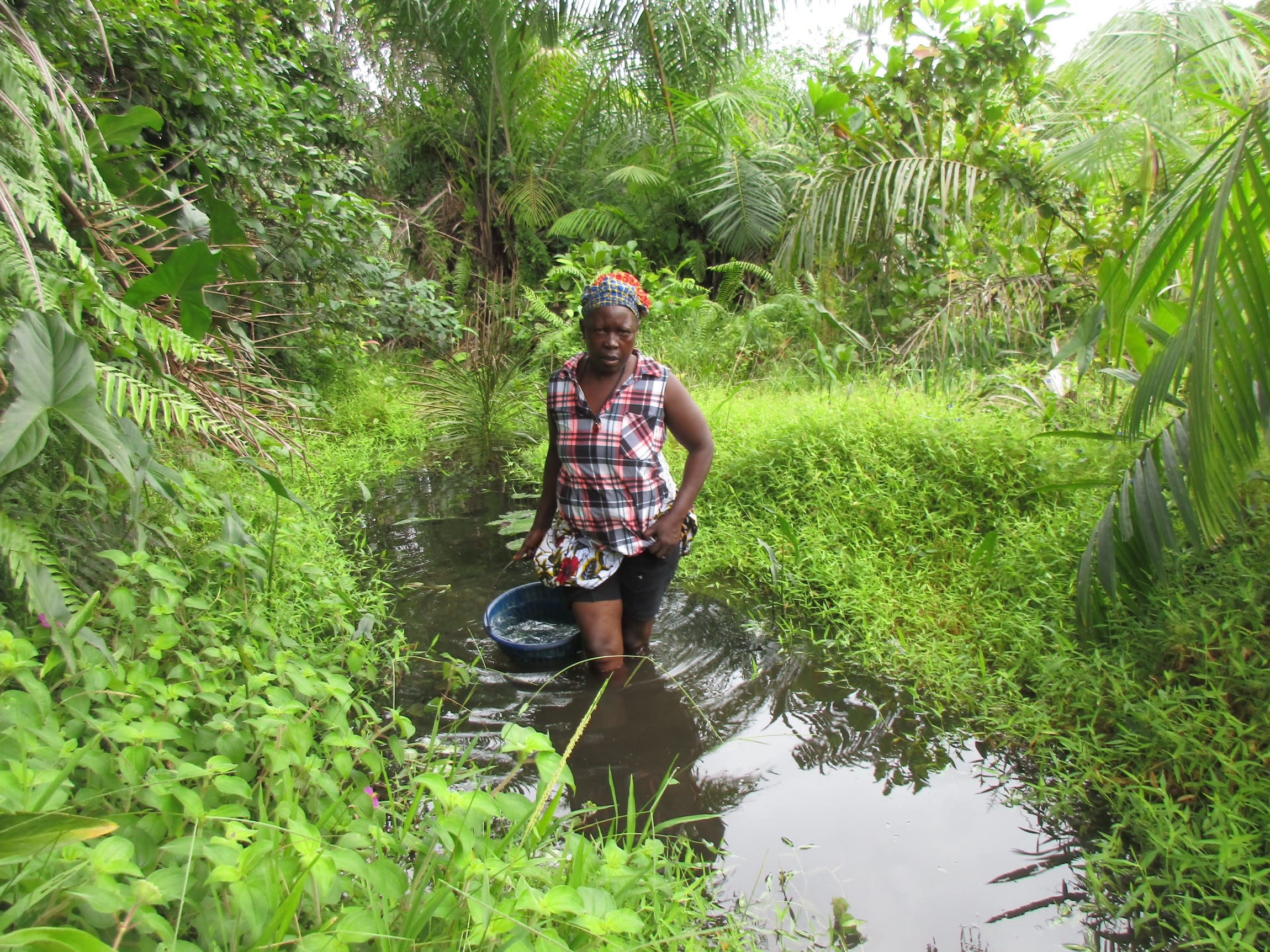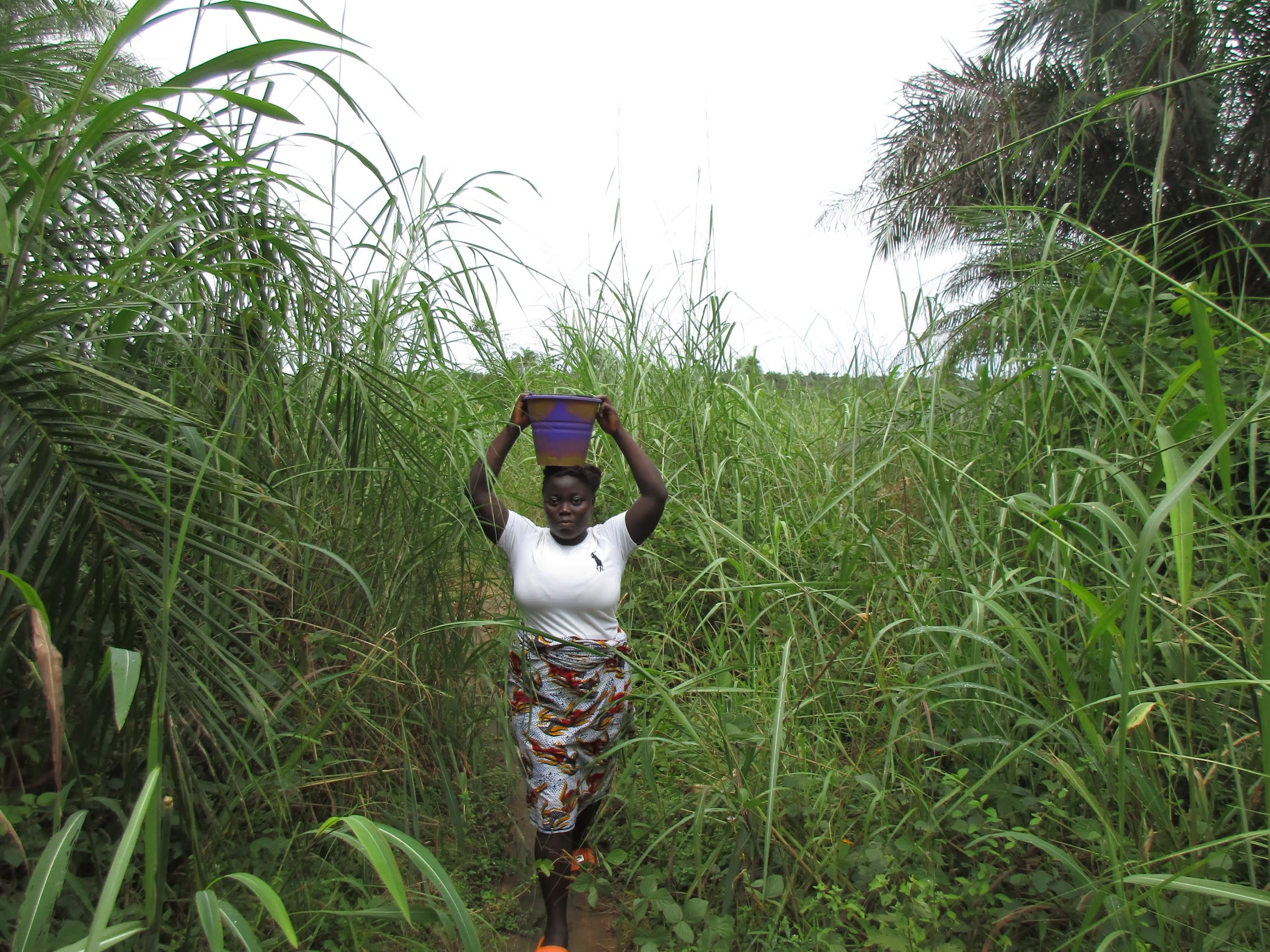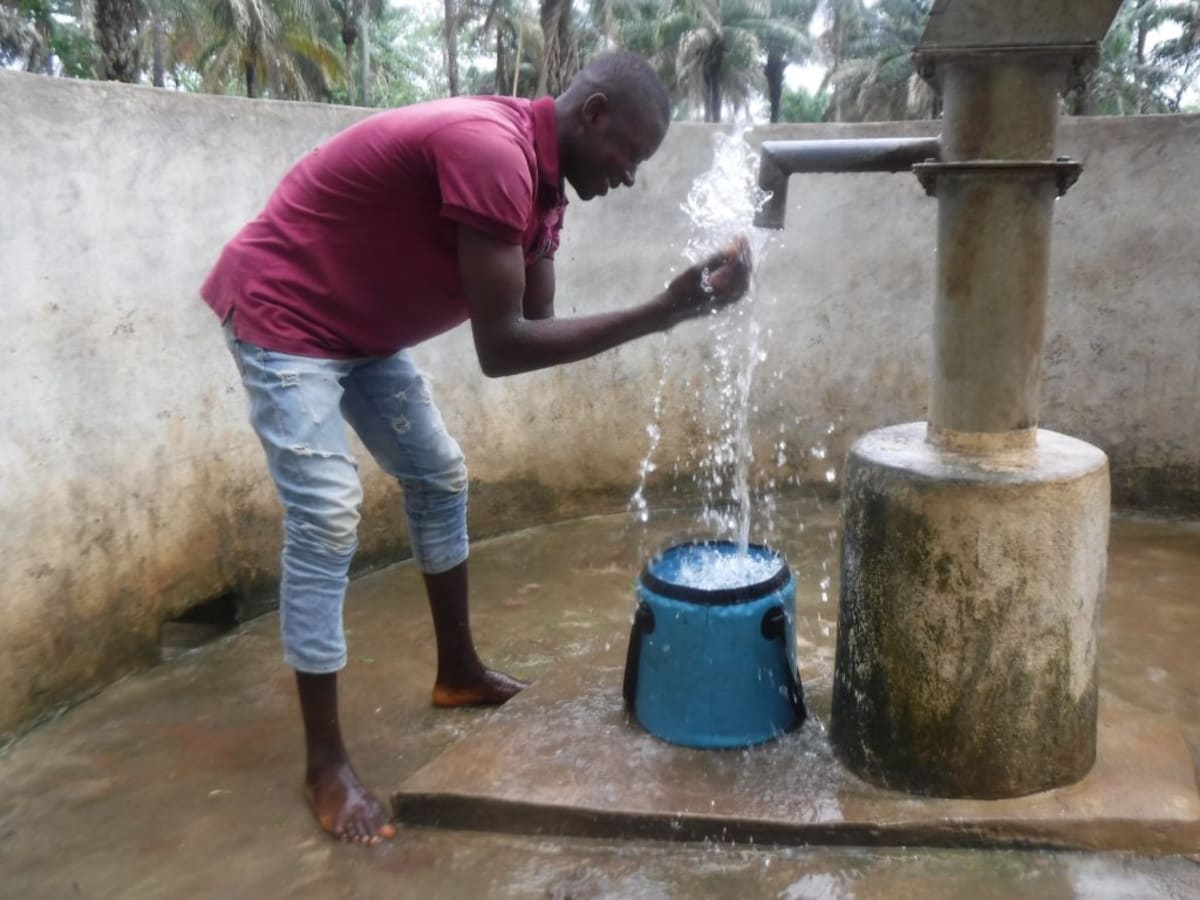December, 2022: Fodaya Community Borehole Well Complete!
We are excited to share that there is now a safe, reliable borehole well at Fodaya. As a result, the community members no longer rely on unsafe water to meet their daily needs. We also conducted hygiene and sanitation training, which focused on healthy practices such as handwashing and using latrines.

"I am happy today because I have access to safe water in my community. Before, I was struggling to fetch water. Today I am happy because I could complete my domestic work such as cooking, laundering, bathing, and bathing my children. I will no longer allow my children to go [to] the swamp to collect water, and I will not be walking far distances to access water," said 41-year-old trader Nancy Conteh.

"It was not easy to fetch water in this community. I would wake up early in the morning to fetch water from the stream. After that, I would rush to the house [to] take my bath and prepare to go to school. Sometimes I [was] late for school, and my teacher [would] flog me or give me work to do at the school field," said 14-year-old Salifu K.

He continued: "Now I will no longer be walking far distances to access water, and I get access to water easily in my community. I will go to school on time and spend more time on my studies."
We held a dedication ceremony to officially hand over the well to the community members. Several local dignitaries attended the ceremony, including representatives from the Ministry of Water Resources and the Ward Council. Each official gave a short speech thanking everyone who contributed to this water project and reminding the community members to take good care of it.

The headman expressed his thanks and appreciation for the tremendous work in their community and his happiness and honor that such goodness came to their village. A youth from the community, Alimamy Bangura, said he is happy for the water well in their community because before he faced constraints accessing safe water but now all the constraints are over. Then, Nancy and Salifu made statements on their community's behalf. The ceremony concluded with celebration, singing, and dancing.
New Well
The drill team arrived the day before beginning work. They set up camp and unpacked all their tools and supplies to prepare for drilling the next day. The community provided space for the team to store their belongings and meals for the duration of their stay. The following day, work began.
Our team dug two pits next to the drill rig, one for the drill’s water supply and another for what the drill pulls out of the borehole. In some cases, we order a private supplier to deliver the water for drilling since water access is already challenging.

Day one of drilling began as the team mixed water with bentonite, an absorbent clay, in the two dug pits. Next, the team fixed a four-inch carbide-tipped bit to the five-foot-long drill stem. They started the mud pump to supply water to the drill rig so that drilling could begin!
After putting each five-foot length of drill stem into the hole, the team took material samples. We labeled the bags to review them later and determine the aquifer locations.

On the second day of drilling, the team expanded the hole and cleared it of mud. After reaching a total depth of 16 meters, the team forcefully pumped clean water into the well to remove any dirt and debris from the drilling process. We then protected the screened pipe by adding a filter pack. The team hoisted the temporary drilling casing to fortify the pipes with cement.

Yield testing.
Next, we bailed the well by hand for three days before conducting a yield test to verify the water quantity. This well has a static water level of 12 meters. With these excellent results, we installed a stainless steel pump. Water quality test results showed that this was clean water fit for drinking!
New Knowledge
Before conducting any hygiene training, we called and visited the local water user committee to understand the community’s challenges and lack of sanitation facilities. We shared the findings from our discussions with the committee members to help them make the necessary adjustments before the training began. For example, we identified households without handwashing stations or ones that may need to repair their latrines. With this information, community members worked together to improve hygiene and sanitation at home.
After this preparatory period, we scheduled a time when members from each household using the water point could attend a three-day hygiene and sanitation training. We then dispatched our teams to the agreed-upon location to hold the meeting.

Training topics covered included handwashing and tippy taps, good and bad hygiene habits, disease transmission and prevention, COVID-19, worms and parasites, proper dental hygiene, proper care of the well's pump, keeping the water clean, the cost recovery system, the importance of using dish racks and clotheslines, the importance of toilets, keeping latrines clean, balanced diets, the diarrhea doll, and HIV and AIDS.
A memorable topic during the training was the session on good and bad hygiene. During this lesson, an elder from the village pointed his finger at the poster which showed an image of a boy defecating behind a house. He said repeatedly that the act of open defecation has been practiced in his community. At first, when he mentioned it, the other participants were embarrassed, but after he finished making his points, everyone gave him a round of applause. They realized that the unhygienic practices of the community were a contributing factor to the sicknesses they experience.

"I personally believe that the hygiene and sanitation training [has] made a lot of positive impacts and [is] still making [an] impact in the lives of the people of Gbonkokabongo Fodaya village," said field officer Alie Kamara.

Building a tippy tap.
"The training was valuable to me because now I understand the importance of Oral Rehydration Salt (ORS). Before, I thought ORS is just for children or those that are sick, but now I know the importance of ORS [which] will help [with] dehydration. Similarly, the knowledge I received on the importance of handwashing will make me practice the act of handwashing regularly and reduce the contracting of diseases," said 55-year-old farmer Pa Morlai Conteh.

Conclusion
This project required a substantial collaboration between our staff, our in-country teams, and the community members themselves. When an issue arises concerning the well, community members are equipped with the necessary skills to rectify the problem and ensure the water point works appropriately. However, if the issue is beyond their capabilities, they can contact their local field officers to assist them.
Also, we will continue to offer them unmatchable support as a part of our monitoring and maintenance program. We walk with each community, problem-solving together when they face challenges with functionality, seasonality, or water quality. Together, all these components help us strive for enduring access to reliable, clean, and safe water for this community.
With your contribution, one more piece has been added to a large puzzle of water projects. In our target areas, we’re working toward complete coverage of reliable, maintained water sources within a 30-minute round trip for each community, household, school, and health center. With this in mind, search through our upcoming projects to see which community you can help next!
Thank you for making all of this possible!




 Borehole Well and Hand Pump
Borehole Well and Hand Pump
 Rehabilitation Project
Rehabilitation Project































